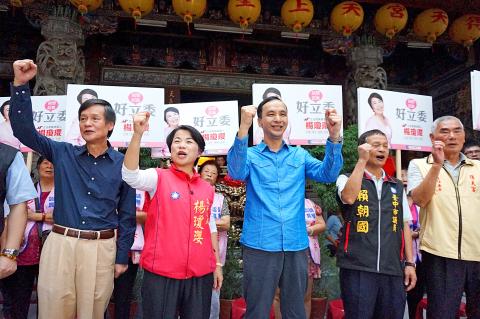Chinese Nationalist Party (KMT) presidential candidate Eric Chu (朱立倫) yesterday accused the Democratic Progressive Party (DPP) of launching a series of malicious attacks against him, saying the public would not support negative campaign tactics.
“At last, because of my presidential nomination the DPP has started moving, from legal actions and impeachment drives to recall motions and an all-out online smear campaign,” Chu said during a visit to a KMT branch and legislative candidates in Taichung. “It seems the DPP can no longer win the January presidential election lying down.”
Chu made the remarks one day after being called in for questioning by the Special Investigation Division (SID) of the Supreme Prosecutors’ Office over his July 19 replacement of Deputy Legislative Speaker Hung Hsiu-chu (洪秀柱) as the KMT’s presidential candidate.

Photo: Ou Su-mei, Taipei Times
The SID initiated a probe into the matter earlier this month after two opposition lawmakers — DPP Legislator Chen Ting-fei (陳亭妃) and Taiwan Solidarity Union Legislator Chou Ni-an (周倪安) — took legal action against Chu and KMT Secretary-General Lee Shu-chuan (李四川) over their alleged attempts to coax Hung into dropping out of the Jan. 16 race by offering her a quid pro quo.
“I am extremely repelled by how a political party or politicians can resort to such methods to try to interfere in next year’s presidential election, and the moves are highly detrimental to Taiwanese democracy,” Chu said after stepping out of the SID’s office on Wednesday night.
“We have done nothing wrong and have nothing to hide,” he said.
Chu urged his opponents to refrain from adopting negative campaign tactics for the sake of Taiwanese democracy and future generations.
“I hope these negative attacks and politically motivated manipulations will stop with this generation,” Chu said. “As the presidential candidate of a party aiming to become the ruling party, [DPP Chairperson] Tsai Ing-wen (蔡英文) should reflect on whether this approach has a positive influence on people.”
Dismissing news reports that he planned to invite Chang Gung Memorial Hospital’s Kaohsiung Branch superintendent Chen Chao-long (陳肇隆), dubbed “the father of liver transplants in Asia,” to be his running mate, Chu said he has not given any thought to the KMT’s potential vice presidential candidates.
“I will keep an open mind. The future leaders of Taiwan do not necessarily have to have a political background or fit certain criteria,” he said.
KMT Vice Chairman Hau Lung-bin (郝龍斌) said he believed every step in Chu and Lee’s handling of the replacement issue was legal, while shrugging off news reports claiming Hung had recorded her meetings with the pair as evidence.
“Attempts by any parties to politically manipulate election results would set a bad example. Hopefully, Chu and Tsai can endeavor to be good role models for the nation’s electoral system and let elections be just about healthy competition, not power struggles,” Hau said.

Taiwan is stepping up plans to create self-sufficient supply chains for combat drones and increase foreign orders from the US to counter China’s numerical superiority, a defense official said on Saturday. Commenting on condition of anonymity, the official said the nation’s armed forces are in agreement with US Admiral Samuel Paparo’s assessment that Taiwan’s military must be prepared to turn the nation’s waters into a “hellscape” for the Chinese People’s Liberation Army (PLA). Paparo, the commander of the US Indo-Pacific Command, reiterated the concept during a Congressional hearing in Washington on Wednesday. He first coined the term in a security conference last

Prosecutors today declined to say who was questioned regarding alleged forgery on petitions to recall Democratic Progressive Party (DPP) legislators, after Chinese-language media earlier reported that members of the Chinese Nationalist Party (KMT) Youth League were brought in for questioning. The Ministry of Justice Investigation Bureau confirmed that two people had been questioned, but did not disclose any further information about the ongoing investigation. KMT Youth League members Lee Hsiao-liang (李孝亮) and Liu Szu-yin (劉思吟) — who are leading the effort to recall DPP caucus chief executive Rosalia Wu (吳思瑤) and Legislator Wu Pei-yi (吳沛憶) — both posted on Facebook saying: “I

Sung Chien-liang (宋建樑), who led efforts to recall Democratic Progressive Party (DPP) Legislator Lee Kun-cheng (李坤城), was released on bail of NT$80,000 today amid outcry over his decision to wear a Nazi armband to questioning the night before. Sung arrived at the New Taipei District Prosecutors’ Office for questioning in a recall petition forgery case last night wearing a red armband bearing a swastika, carrying a copy of Adolf Hitler’s Mein Kampf and giving a Nazi salute. Sung left the building at 1:15am without the armband and covering the book with his coat. Lee said today that this is a serious

The Ministry of Economic Affairs has fined Taobao NT$1.2 million (US$36,912) for advertisements that exceed its approved business scope, requiring the Chinese e-commerce platform to make corrections in the first half of this year or its license may be revoked. Lawmakers have called for stricter enforcement of Chinese e-commerce platforms and measures to prevent China from laundering its goods through Taiwan in response to US President Donald Trump’s heavy tariffs on China. The Legislative Yuan’s Finance Committee met today to discuss policies to prevent China from dumping goods in Taiwan, inviting government agencies to report. Democratic Progressive Party Legislator Kuo Kuo-wen (郭國文) said